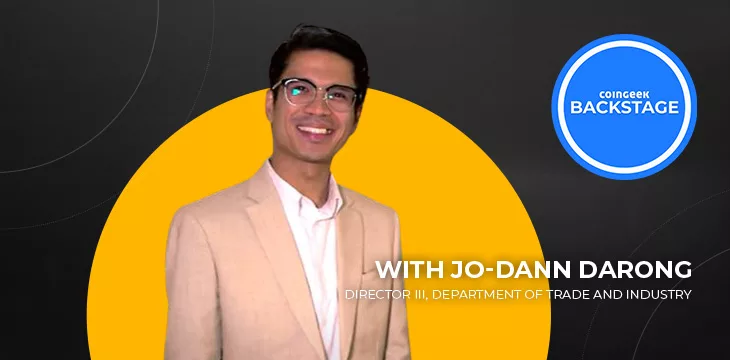|
Getting your Trinity Audio player ready...
|
The Philippines may owe the swift adoption of emerging technologies to the gaming sector, but there is also one industry often overlooked by many that could trigger the mass adoption of blockchain technology.
Department of Trade and Industry (DTI) Director Jo-Dann Darong reveals to CoinGeek Backstage the current strategy that the agency is implementing to support the government’s blockchain ambition, with the creative sector at the forefront.
DTI’s science, technology, and innovation (STI)-driven industrialization strategy puts focus on what major sectors should blockchain technology be incorporated first, with Darong telling host Claire Celdran the addition of the creative industry on the priority list.
Triggering a mass adoption of a specific technology, especially in developing countries like the Philippines, greatly depends on the accessibility and ease of use, which Darong said the creative industry could easily offer through blockchain tech.
“The adoption [in the creative industry] is more likely visible and easy to propose or move as an agenda,” Darong said of the DTI’s pitch to digitalize the sector using blockchain technology.
As visual creators catch up with technological developments, the DTI director said blockchain is being seen as a key mechanism not only to help spur the adoption of the emerging technology but also to heighten the competitiveness of the creative sector.
“We are now looking at blockchain as a way for our creative sector to be at par with our creative world out there because the creative economy in the world has been using blockchain for quite some time,” noted Darong, stressing that paintings, sketches, and other visual arts nowadays are being transformed into non-fungible tokens (NFTs).
While DTI’s vision seems promising, Darong admitted that the government agency is still learning what blockchain is and what it can do before coming up with initiatives centered on the commercial use of the technology and one that would allow the public to use it for their benefit.
“We don’t have specific initiative yet, but at least in the discussion in the policymaking, we are bringing the blockchain flavor already,” Darong said, adding that the primary focus is educating the government about the potential and prospects of blockchain, noting that this is critical not only to attain mass adoption but to boost the country’s competitiveness.
Darong also highlighted how blockchain could solve the problem of information asymmetry in enterprises, which would prevent one entity from lagging behind and provide a more trusted business ecosystem.
“Blockchain has provided another option for people to derisk themselves and to actually…give more emphasis on how to do business rather than asking themselves whether the person is trusted or not—whether transaction is protected, whether transaction is sustainable,” he added.
Watch: BSV Blockchain Meetup Manila highlights—Putting scalable blockchain tech on the Philippine map

 02-15-2026
02-15-2026 




